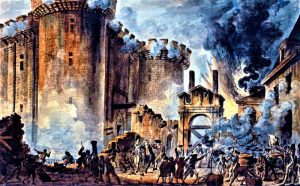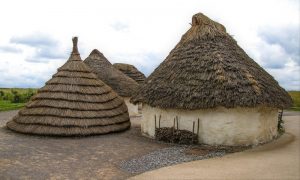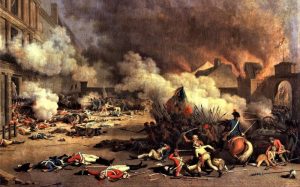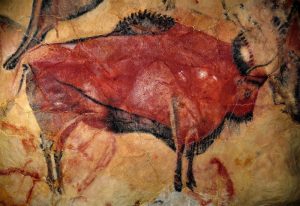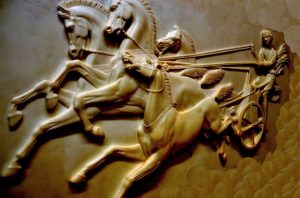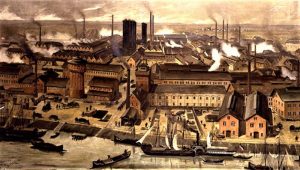Carolingian Empire
The Carolingians, who succeeded the Merovingians, reigned in Western Europe from the 750s until the end of the 10th century. With the Church of Rome's support, the power of the Carolingian Empire is marked by having achieved almost the unity of the Christian West thanks to great reforms implemented by Pipinus the Brief, and under his son empire, Charlemagne, who followed them in the religious, administrative, legislative and educational spheres.
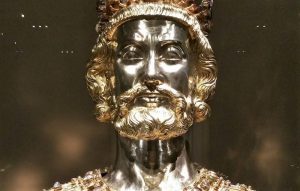
General Aspects
- Capital city: Aachen
- Religion: Christianity
- Government: Monarchy
- Emperors: Charlemagne (768-814), Louis I (814-840), Lottery (840-843)
What was the Carolingian Empire?
The term Carolingian Empire is named after the Carolingian dynasty that reigned in Western Europe in the 8th century. This empire constitutes a political and territorial organization that marked a crucial point in France's creation as we know it today. Indeed, the Carolingians were descendants of the Frankish towns. With the arrival of the Carolingian Empire, the Merovingians, who had been in power since the 6th century, fell.
Characteristics
One of the peculiarities of the Carolingian Empire was its social structure based on a pyramid of fidelity bonuses. At the top of the pyramid was the emperor. To reinforce his authority, Charlemagne developed the vassalage system. In order to strengthen the bonds between himself and the nobles, he concedes them lands in exchange for their obedience and fidelity. These great lords became Charlemagne’s vassals. In this way, the emperor made sure to have faithful men ready to help him in case of war.
The farmers worked the land. Some of them were servants, in other words, they had no freedom to leave the land and their owners could exercise their rights over them. In that sense, not everyone was free during the Carolingian Empire.
On the other hand, it is important to highlight the organization of the empire, which was divided into: the counties, the brands and the duchies. The counties generally corresponded to the territory of a city. They were administered by counts, who were nominated by the emperor. They were responsible for justice and protection of the county. They also collected taxes. On the other hand, the marks were militarized areas that were in the borders of the Empire’s territories, established to defend the place against external attacks. These were ruled by a Marquis. Finally, the duchies constituted the union of several counties and were ruled by a Duke.
Location
It is important to point out that what we know today as France became the nucleus of Western Europe during the Carolingian era.
The Carolingian dynasty inherited the Merovingian territories and began a policy of conquest.
Carolingian Empire culture
Charlemagne, emperor of the Carolingian Empire, was a great promoter of culture. During this time, most people could neither read nor write and even Charlemagne was illiterate. Thus, the emperor opened schools for public officials and religious education such as the Palatine School, which was in Aachen.
In the same order of ideas, schools were created in places of worship such as churches and monasteries. There, high-value libraries were created that possessed works of Latin culture. On the other hand, thanks to this cultural Renaissance, during this empire’s reign, writers and thinkers emerged and the arts and sciences developed.
Despite the cultural Renaissance apogee, only nobles and clergy had access to it.
Economics
Economy is based on agriculture, the main source of wealth and power. The great possessions are the villas, the abbeys and the bishops’ lands. There was a lordly system in which peasants could cultivate the land under the condition of paying a tax. Thus, the landowners were rich and powerful while the large mass of peasants lived miserably. All this resulted in a feudal production system. Cereals were the main crop.
Commercial exchanges were not very developed due to the wars of the time and because there was a self-sufficient economy. In addition, numerous trade taxes also reduce traffic.
Carolingian Empire’s religion
The relationship between the Carolingian Empire and the Catholic Church was one of mutual benefit and political expediency. The papacy granted spiritual legitimacy to the Frankish kings, while the kings provided the church with military protection and power. Thus, together, the Carolingian reign and the Christian church fought for political and religious unification of Western Europe. Charlemagne as a Christian wanted to extend the Christian religion beyond the limits of his territory. As such, he was in charge of German expeditions against his pagan people, the Saxons succeeding in obtaining their conversion. He also ventured into Muslim Spain but was unsuccessful in defeating the Emir in Cordoba on the Iberian Peninsula.
How to cite this article?
Briceño V., Gabriela. (2019). Carolingian Empire. Recovered on 4 January, 2025, de Euston96: https://www.euston96.com/en/carolingian-empire/



